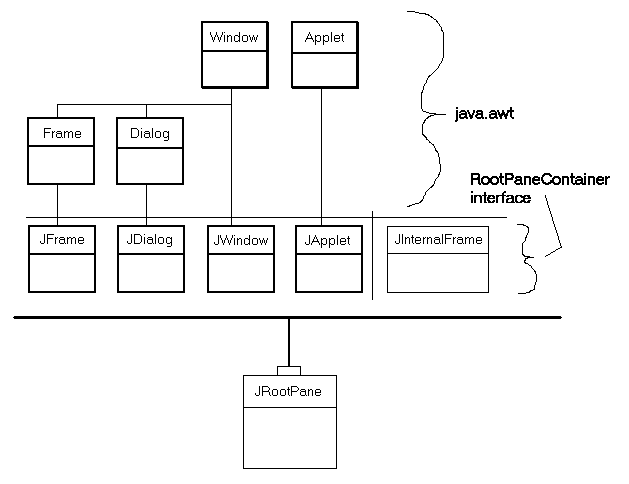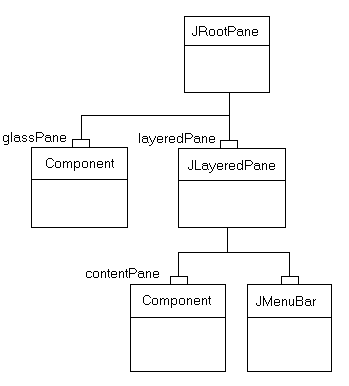JRootPane (Java 2 Platform SE 5.0) - JavaTM 2 Platform Standard Edition 5.0 API 规范中文版
|
JavaTM 2 Platform Standard Ed. 5.0 |
|||||||||
| 上一个类 下一个类 | 框架 无框架 | |||||||||
| 摘要: 嵌套 | 字段 | 构造方法 | 方法 | 详细信息: 字段 | 构造方法 | 方法 | |||||||||
javax.swing
类 JRootPane
java.lang.Objectjava.awt.Component
java.awt.Container
javax.swing.JComponent
javax.swing.JRootPane
- 所有已实现的接口:
- ImageObserver, MenuContainer, Serializable, Accessible
public class JRootPane
- extends JComponent
- implements Accessible
- extends JComponent
该轻量级容器由 JFrame、JDialog、JWindow、JApplet 和 JInternalFrame 在后台使用。有关根窗格所提供功能的面向任务的信息,请参阅《The Java Tutorial》中的 How to Use Root Panes 一节。
下面的图像显示了使用根窗格的各个类之间的关系。

JFrame、JDialog、JWindow 和 JApplet)的显示与它们扩展的 AWT 类有关。这四个组件是 Swing 库中仅有的重量级容器。这里还显示了轻量级容器 JInternalPane。所有这五个 JFC/Swing 容器都实现 RootPaneContainer 接口,并且它们都将其操作委托给 JRootPane(顶端显示有一个小 "handle")。
注:使用JComponent的getRootPane方法可获取包含给定组件的JRootPane。

|
JRootPane 的结构。JRootpane 由一个 glassPane 和一个可选的 menuBar 以及一个 contentPane 组成。(JLayeredPane 负责管理 menuBar 和 contentPane。)glassPane 位于所有窗格之上,以便能够截取鼠标移动。由于 glassPane(与 contentPane 类似)可以是一个任意的组件,也可以设置 glassPane 来进行绘制。这样 glassPane 上的线条和图像可涵盖其下的窗体,不受其边界的限制。
尽管 menuBar 组件为可选,但 layeredPane、contentPane 和 glassPane 总是存在的。试图将它们设置为 null 将生成异常。
要将组件添加到 JRootPane(可选的菜单栏除外),您可以将对象添加到 JRootPane 的 contentPane,如下所示:
rootPane.getContentPane().add(child);
可用同样的方法设置布局管理器、移除组件以及列出子级等。所有这些方法都是在 contentPane 上而不是 JRootPane 上调用的。
注:如果已在contentPane的默认布局管理器是BorderLayout管理器。但是,JRootPane使用一个自定义的LayoutManager。所以,如果您希望更改已添加到JRootPane中的组件的布局管理器,一定要确保使用如下代码:rootPane.getContentPane().setLayout(new BoxLayout());
JRootPane 上设置了 JMenuBar 组件,它将沿窗体的上边缘放置。contentPane 的位置和大小将进行调整以填充剩余的区域。(JMenuBar 和 contentPane 被添加到位于 JLayeredPane.FRAME_CONTENT_LAYER 层的 layeredPane 组件中。)
layeredPane 是 JRootPane 中所有子级的父级,既是菜单的直接父级,又是添加到 contentPane 中的所有组件的祖父级。它是 JLayeredPane 的实例,提供在若干层上添加组件的能力。在处理弹出菜单、对话框以及拖动时,即要求将组件置于窗格中所有其它组件之上的情况下,此功能非常有用。
glassPane 位于 JRootPane 中所有其它组件之上。这为在所有其它组件上绘图和截取鼠标事件提供了方便,这对拖动和绘图都非常有用。开发人员可在 glassPane 上使用 setVisible 控制 glassPane 在所有其它子级上面显示的时间。默认情况下,glassPane 为不可见。
JRootPane 所使用的自定义 LayoutManager 可确保:
glassPane填充了JRootPane的整个可查看区域(边界 - insets)。layeredPane填充了JRootPane的整个可查看区域。(边界 - insets)menuBar位于layeredPane的上边缘。contentPane填充了整个可查看区域,减去menuBar(如果有)。
JRootPane 视图层次结构中的任何其它视图均忽略。
如果您替换 JRootPane 的 LayoutManager,您将负责管理所有这些视图。所以通常情况下,应该确保更改的是 contentPane 的布局管理器,而不是 JRootPane 自身的布局管理器。
Swing 的绘制架构要求在所有其它组件之上的包含层次结构中有一个不透明的 JComponent。这通常通过使用内容窗格来实现。如果要替换内容窗格,建议使用 setOpaque(true) 将内容窗格设置为不透明。另外,如果内容窗格重写 paintComponent,还需要在 paintComponent 中用不透明颜色将背景完全填充。
警告:此类的序列化对象将与以后的 Swing 版本不兼容。当前的序列化支持适用于短期存储或运行相同 Swing 版本的应用程序之间的 RMI。从 1.4 版本开始,已在 java.beans 包中添加了支持所有 JavaBeansTM 长期存储的功能。请参阅 XMLEncoder。
- 另请参见:
JLayeredPane,JMenuBar,JWindow,JFrame,JDialog,JApplet,JInternalFrame,JComponent,BoxLayout, Mixing Heavy and Light Components
| 嵌套类摘要 | |
|---|---|
protected class |
JRootPane.AccessibleJRootPane
此类实现对 JRootPane 类的可访问性支持。 |
protected class |
JRootPane.RootLayout
该自定义布局管理器负责 layeredPane、glassPane 和 menuBar 的布局。 |
| 从类 javax.swing.JComponent 继承的嵌套类/接口 |
|---|
JComponent.AccessibleJComponent |
| 从类 java.awt.Container 继承的嵌套类/接口 |
|---|
Container.AccessibleAWTContainer |
| 从类 java.awt.Component 继承的嵌套类/接口 |
|---|
Component.AccessibleAWTComponent, Component.BltBufferStrategy, Component.FlipBufferStrategy |
| 字段摘要 | |
|---|---|
static int |
COLOR_CHOOSER_DIALOG
供 windowDecorationStyle 属性使用的常量。 |
protected Container |
contentPane
内容窗格。 |
protected JButton |
defaultButton
当窗格成为焦点并有类似按下 Enter 键的特定于 UI 的操作发生时被激活的按钮。 |
protected javax.swing.JRootPane.DefaultAction |
defaultPressAction
已过时。 从 Java 2 platform v1.3 开始 |
protected javax.swing.JRootPane.DefaultAction |
defaultReleaseAction
已过时。 从 Java 2 platform v1.3 开始 |
static int |
ERROR_DIALOG
供 windowDecorationStyle 属性使用的常量。 |
static int |
FILE_CHOOSER_DIALOG
供 windowDecorationStyle 属性使用的常量。 |
static int |
FRAME
供 windowDecorationStyle 属性使用的常量。 |
protected Component |
glassPane
覆盖菜单栏和内容窗格的玻璃窗格,便于截取鼠标移动等操作。 |
static int |
INFORMATION_DIALOG
供 windowDecorationStyle 属性使用的常量。 |
protected JLayeredPane |
layeredPane
管理菜单栏和内容窗格的分层窗格。 |
protected JMenuBar |
menuBar
菜单栏。 |
static int |
NONE
供 windowDecorationStyle 属性使用的常量。 |
static int |
PLAIN_DIALOG
供 windowDecorationStyle 属性使用的常量。 |
static int |
QUESTION_DIALOG
供 windowDecorationStyle 属性使用的常量。 |
static int |
WARNING_DIALOG
供 windowDecorationStyle 属性使用的常量。 |
| 从类 javax.swing.JComponent 继承的字段 |
|---|
accessibleContext, listenerList, TOOL_TIP_TEXT_KEY, ui, UNDEFINED_CONDITION, WHEN_ANCESTOR_OF_FOCUSED_COMPONENT, WHEN_FOCUSED, WHEN_IN_FOCUSED_WINDOW |
| 从类 java.awt.Component 继承的字段 |
|---|
BOTTOM_ALIGNMENT, CENTER_ALIGNMENT, LEFT_ALIGNMENT, RIGHT_ALIGNMENT, TOP_ALIGNMENT |
| 从接口 java.awt.image.ImageObserver 继承的字段 |
|---|
ABORT, ALLBITS, ERROR, FRAMEBITS, HEIGHT, PROPERTIES, SOMEBITS, WIDTH |
| 构造方法摘要 | |
|---|---|
JRootPane()
创建 JRootPane,设置其 glassPane、layeredPane 以及 contentPane。 |
|
| 方法摘要 | |
|---|---|
protected void |
addImpl(Component comp,
Object constraints,
int index)
重写以便将玻璃组件的位置强行设置成零位子级。 |
void |
addNotify()
将本身注册为 SystemEventQueueUtils 的新的根窗格。 |
protected Container |
createContentPane()
由构造方法调用以便创建默认的 contentPane。 |
protected Component |
createGlassPane()
由构造方法调用以便创建默认的 glassPane。 |
protected JLayeredPane |
createLayeredPane()
由构造方法调用以便创建默认的 layeredPane。 |
protected LayoutManager |
createRootLayout()
由构造方法调用以便创建默认的 layoutManager。 |
AccessibleContext |
getAccessibleContext()
获得与此 JRootPane 相关联的 AccessibleContext。 |
Container |
getContentPane()
返回内容窗格,它是保存以根窗格为父级的组件的容器。 |
JButton |
getDefaultButton()
返回 defaultButton 属性的值。 |
Component |
getGlassPane()
返回此 JRootPane 的当前玻璃窗格。 |
JMenuBar |
getJMenuBar()
返回窗格层的菜单栏。 |
JLayeredPane |
getLayeredPane()
获取供根窗格使用的分层窗格。 |
JMenuBar |
getMenuBar()
已过时。 从 Swing 版本 1.0.3 开始,由 getJMenubar() 取代。 |
RootPaneUI |
getUI()
返回呈现此组件的 L&F 对象。 |
String |
getUIClassID()
返回一个指定呈现此组件的 L&F 类名称的字符串。 |
int |
getWindowDecorationStyle()
返回一个常量,它标识 JRootPane 提供的 Window 装饰类型。 |
boolean |
isOptimizedDrawingEnabled()
glassPane 和 contentPane 具有相同的边界,这意味着 JRootPane 并不对其子级平铺,应返回 false。 |
boolean |
isValidateRoot()
如果此 JRootPane 的一个后代调用 revalidate,将从此位置开始进行验证。 |
protected String |
paramString()
返回此 JRootPane 的字符串表示形式。 |
void |
removeNotify()
将本身从 SystemEventQueueUtils 注销。 |
void |
setContentPane(Container content)
设置内容窗格,它是保存以根窗格为父级的组件的容器。 |
void |
setDefaultButton(JButton defaultButton)
设置 defaultButton 属性,它确定此 JRootPane 的当前默认按钮。 |
void |
setGlassPane(Component glass)
将指定的 Component 设置为此根窗格的玻璃窗格。 |
void |
setJMenuBar(JMenuBar menu)
添加或更改在分层窗格中使用的菜单栏。 |
void |
setLayeredPane(JLayeredPane layered)
设置供根窗格使用的分层窗格。 |
void |
setMenuBar(JMenuBar menu)
已过时。 从 Swing 版本 1.0.3 开始,由 setJMenuBar(JMenuBar menu) 取代。 |
void |
setUI(RootPaneUI ui)
设置呈现此组件的 L&F 对象。 |
void |
setWindowDecorationStyle(int windowDecorationStyle)
设置 JRootPane 应提供的 Window 装饰类型(例如,边界、关闭 Window 的小部件、标题等)。 |
void |
updateUI()
将 UI 属性重置为当前外观对应的值。 |
| 从类 java.lang.Object 继承的方法 |
|---|
clone, equals, finalize, getClass, hashCode, notify, notifyAll, wait, wait, wait |
| 字段详细信息 |
|---|
NONE
public static final int NONE
- 供 windowDecorationStyle 属性使用的常量。指示
JRootPane不应提供任何类型的 Window 装饰。- 从以下版本开始:
- 1.4
- 另请参见:
- 常量字段值
FRAME
public static final int FRAME
- 供 windowDecorationStyle 属性使用的常量。指示
JRootPane应提供适合 Frame 的装饰。- 从以下版本开始:
- 1.4
- 另请参见:
- 常量字段值
PLAIN_DIALOG
public static final int PLAIN_DIALOG
- 供 windowDecorationStyle 属性使用的常量。指示
JRootPane应提供适合 Dialog 的装饰。- 从以下版本开始:
- 1.4
- 另请参见:
- 常量字段值
INFORMATION_DIALOG
public static final int INFORMATION_DIALOG
- 供 windowDecorationStyle 属性使用的常量。指示
JRootPane应提供适合 Dialog 的装饰以便显示一条报告消息。- 从以下版本开始:
- 1.4
- 另请参见:
- 常量字段值
ERROR_DIALOG
public static final int ERROR_DIALOG
- 供 windowDecorationStyle 属性使用的常量。指示
JRootPane应提供适合 Dialog 的装饰以便显示一条错误消息。- 从以下版本开始:
- 1.4
- 另请参见:
- 常量字段值
COLOR_CHOOSER_DIALOG
public static final int COLOR_CHOOSER_DIALOG
- 供 windowDecorationStyle 属性使用的常量。指示
JRootPane应提供适合 Dialog 的装饰以便显示JColorChooser。- 从以下版本开始:
- 1.4
- 另请参见:
- 常量字段值
FILE_CHOOSER_DIALOG
public static final int FILE_CHOOSER_DIALOG
- 供 windowDecorationStyle 属性使用的常量。指示
JRootPane应提供适合 Dialog 的装饰以便显示JFileChooser。- 从以下版本开始:
- 1.4
- 另请参见:
- 常量字段值
QUESTION_DIALOG
public static final int QUESTION_DIALOG
- 供 windowDecorationStyle 属性使用的常量。指示
JRootPane应提供适合 Dialog 的装饰以便向用户显示一个问题。- 从以下版本开始:
- 1.4
- 另请参见:
- 常量字段值
WARNING_DIALOG
public static final int WARNING_DIALOG
- 供 windowDecorationStyle 属性使用的常量。指示
JRootPane应提供适合 Dialog 的装饰以便显示一条警告消息。- 从以下版本开始:
- 1.4
- 另请参见:
- 常量字段值
menuBar
protected JMenuBar menuBar
- 菜单栏。
contentPane
protected Container contentPane
- 内容窗格。
layeredPane
protected JLayeredPane layeredPane
- 管理菜单栏和内容窗格的分层窗格。
glassPane
protected Component glassPane
- 覆盖菜单栏和内容窗格的玻璃窗格,便于截取鼠标移动等操作。
defaultButton
protected JButton defaultButton
- 当窗格成为焦点并有类似按下 Enter 键的特定于 UI 的操作发生时被激活的按钮。
defaultPressAction
@Deprecated protected javax.swing.JRootPane.DefaultAction defaultPressAction
- 已过时。 从 Java 2 platform v1.3 开始
- 从 Java 2 platform v1.3 开始,此无用字段已不再使用。要重写默认的按钮,应在
JRootPane的ActionMap中替换Action。有关进一步的细节,请参阅键绑定规范。- 另请参见:
defaultButton
- 从 Java 2 platform v1.3 开始,此无用字段已不再使用。要重写默认的按钮,应在
defaultReleaseAction
@Deprecated protected javax.swing.JRootPane.DefaultAction defaultReleaseAction
- 已过时。 从 Java 2 platform v1.3 开始
- 从 Java 2 platform v1.3 开始,此无用字段已不再使用。要重写默认的按钮,应在
JRootPane的ActionMap中替换Action。有关进一步的细节,请参阅键绑定规范。- 另请参见:
defaultButton
- 从 Java 2 platform v1.3 开始,此无用字段已不再使用。要重写默认的按钮,应在
| 构造方法详细信息 |
|---|
JRootPane
public JRootPane()
- 创建
JRootPane,设置其glassPane、layeredPane以及contentPane。
| 方法详细信息 |
|---|
getWindowDecorationStyle
public int getWindowDecorationStyle()
- 返回一个常量,它标识
JRootPane提供的 Window 装饰类型。- 返回:
NONE、FRAME、PLAIN_DIALOG、INFORMATION_DIALOG、ERROR_DIALOG、COLOR_CHOOSER_DIALOG、FILE_CHOOSER_DIALOG、QUESTION_DIALOG或WARNING_DIALOG之一。- 从以下版本开始:
- 1.4
- 另请参见:
setWindowDecorationStyle(int)
setWindowDecorationStyle
public void setWindowDecorationStyle(int windowDecorationStyle)
- 设置
JRootPane应提供的 Window 装饰类型(例如,边界、关闭 Window 的小部件、标题等)。默认不提供任何 Window 装饰 (NONE)。这只是一个提示,有些外观可能不支持。这是一个 bound 属性。
- 参数:
windowDecorationStyle- 标识要提供的 Window 装饰的常量。- 抛出:
IllegalArgumentException- 如果style不是下列常量之一:NONE、FRAME、PLAIN_DIALOG、INFORMATION_DIALOG、ERROR_DIALOG、COLOR_CHOOSER_DIALOG、FILE_CHOOSER_DIALOG、QUESTION_DIALOG或WARNING_DIALOG。- 从以下版本开始:
- 1.4
- 另请参见:
JDialog.setDefaultLookAndFeelDecorated(boolean),JFrame.setDefaultLookAndFeelDecorated(boolean),LookAndFeel.getSupportsWindowDecorations()
getUI
public RootPaneUI getUI()
- 返回呈现此组件的 L&F 对象。
- 返回:
LabelUI对象- 从以下版本开始:
- 1.3
setUI
public void setUI(RootPaneUI ui)
- 设置呈现此组件的 L&F 对象。
- 参数:
ui-LabelUIL&F 对象- 从以下版本开始:
- 1.3
- 另请参见:
UIDefaults.getUI(javax.swing.JComponent)
updateUI
public void updateUI()
- 将 UI 属性重置为当前外观对应的值。
- 覆盖:
- 类
JComponent中的updateUI
getUIClassID
public String getUIClassID()
- 返回一个指定呈现此组件的 L&F 类名称的字符串。
- 覆盖:
- 类
JComponent中的getUIClassID
- 返回:
- "RootPaneUI" 字符串
- 另请参见:
JComponent.getUIClassID(),UIDefaults.getUI(javax.swing.JComponent)
createLayeredPane
protected JLayeredPane createLayeredPane()
- 由构造方法调用以便创建默认的
layeredPane。默认情况下创建一个新的JLayeredPane。- 返回:
- 默认的
layeredPane
createContentPane
protected Container createContentPane()
- 由构造方法调用以便创建默认的
contentPane。默认情况下,此方法创建新的JComponent并将BorderLayout设置为它的LayoutManager。- 返回:
- 默认的
contentPane
createGlassPane
protected Component createGlassPane()
- 由构造方法调用以便创建默认的
glassPane。默认情况下,此方法创建新的JComponent,其可见性设置为 false。- 返回:
- 默认的
glassPane
createRootLayout
protected LayoutManager createRootLayout()
- 由构造方法调用以便创建默认的
layoutManager。- 返回:
- 默认的
layoutManager.
setJMenuBar
public void setJMenuBar(JMenuBar menu)
- 添加或更改在分层窗格中使用的菜单栏。
- 参数:
menu- 要添加的JMenuBar
setMenuBar
@Deprecated public void setMenuBar(JMenuBar menu)
- 已过时。 从 Swing 版本 1.0.3 开始,由
setJMenuBar(JMenuBar menu)取代。- 指定菜单栏的值。
- 参数:
menu- 要添加的JMenuBar。
- 指定菜单栏的值。
getJMenuBar
public JMenuBar getJMenuBar()
- 返回窗格层的菜单栏。
- 返回:
- 该窗格中使用的
JMenuBar
getMenuBar
@Deprecated public JMenuBar getMenuBar()
- 已过时。 从 Swing 版本 1.0.3 开始,由
getJMenubar()取代。- 返回菜单栏的值。
- 返回:
- 窗格中使用的
JMenuBar
- 返回菜单栏的值。
setContentPane
public void setContentPane(Container content)
- 设置内容窗格,它是保存以根窗格为父级的组件的容器。
Swing 的绘制架构要求在包含层次结构中有一个不透明的
JComponent。这通常由内容窗格提供。如果要替换内容窗格,则建议用一个不透明的JComponent来替代。- 参数:
content- 供组件内容使用的Container- 抛出:
IllegalComponentStateException- (运行时异常)如果内容窗格参数为null
getContentPane
public Container getContentPane()
- 返回内容窗格,它是保存以根窗格为父级的组件的容器。
- 返回:
- 保存组件内容的
Container
setLayeredPane
public void setLayeredPane(JLayeredPane layered)
- 设置供根窗格使用的分层窗格。分层窗格通常容纳一个内容窗格和一个可选的
JMenuBar。- 参数:
layered- 要使用的JLayeredPane- 抛出:
IllegalComponentStateException- (运行时异常)如果分层窗格参数为null
getLayeredPane
public JLayeredPane getLayeredPane()
- 获取供根窗格使用的分层窗格。分层窗格通常保存一个内容窗格和一个可选的
JMenuBar。- 返回:
- 当前使用的
JLayeredPane
setGlassPane
public void setGlassPane(Component glass)
- 将指定的
Component设置为此根窗格的玻璃窗格。玻璃窗格通常应该是一个轻量级的、透明的组件,因为每当根窗格需要抓取输入事件时会将它设置为可见。例如,使用 DefaultDesktop 时只有一个JInternalFrame曾经被激活,任何非激活的JInternalFrame玻璃窗格将被设置为可见,这样在一个非激活的JInternalFrame中单击任何位置都可以将它激活。- 参数:
glass- 要用作此JRootPane的玻璃窗格的Component- 抛出:
NullPointerException- 如果glass参数为null
getGlassPane
public Component getGlassPane()
- 返回此
JRootPane的当前玻璃窗格。- 返回:
- 当前的玻璃窗格
- 另请参见:
setGlassPane(java.awt.Component)
isValidateRoot
public boolean isValidateRoot()
- 如果此
JRootPane的一个后代调用revalidate,将从此位置开始进行验证。推迟对一个组件及其后代再次布局的请求。例如,对
revalidate的调用被上推至JRootPane或JScrollPane,因为两个类都重写isValidateRoot以返回 true。- 覆盖:
- 类
JComponent中的isValidateRoot
- 返回:
- true
- 另请参见:
JComponent.isValidateRoot()
isOptimizedDrawingEnabled
public boolean isOptimizedDrawingEnabled()
glassPane和contentPane具有相同的边界,这意味着JRootPane并不对其子级平铺,应返回 false。另一方面,glassPane通常为不可见,所以如果glassPane为不可见时,它会返回 true。因此,这里的返回值取决于glassPane的可见性。- 覆盖:
- 类
JComponent中的isOptimizedDrawingEnabled
- 返回:
- 如果此组件的子级不重叠,则返回 true
addNotify
public void addNotify()
- 将本身注册为
SystemEventQueueUtils的新的根窗格。- 覆盖:
- 类
JComponent中的addNotify
removeNotify
public void removeNotify()
- 将本身从
SystemEventQueueUtils注销。- 覆盖:
- 类
JComponent中的removeNotify
- 另请参见:
addNotify()
setDefaultButton
public void setDefaultButton(JButton defaultButton)
- 设置
defaultButton属性,它确定此JRootPane的当前默认按钮。默认的按钮是根窗格中发生 UI 定义的激活事件(通常是 Enter 键)时将被激活的按钮,无论按钮是否成为键盘焦点(除非根窗格中另有一个组件使用此激活事件,例如一个JTextPane)。为使默认的激活正常工作,在激活发生时该按钮必须是根窗格的一个已启用的后代。要从此根窗格移除一个默认的按钮,设置此属性为null。- 参数:
defaultButton- 将成为默认按钮的JButton- 另请参见:
JButton.isDefaultButton()
getDefaultButton
public JButton getDefaultButton()
- 返回
defaultButton属性的值。- 返回:
- 当前为默认按钮的
JButton - 另请参见:
setDefaultButton(javax.swing.JButton)
addImpl
protected void addImpl(Component comp, Object constraints, int index)
- 重写以便将玻璃组件的位置强行设置成零位子级。
- 参数:
comp- 要增强的组件constraints- 要遵守的约束条件index- 索引- 另请参见:
Container.add(Component),Container.add(Component, int),Container.add(Component, java.lang.Object),LayoutManager,LayoutManager2
paramString
protected String paramString()
- 返回此
JRootPane的字符串表示形式。此方法仅在进行调试的时候使用,对于各个实现,所返回字符串的内容和格式可能有所不同。返回的字符串可能为空,但不可能为null。- 覆盖:
- 类
JComponent中的paramString
- 返回:
- 此
JRootPane的字符串表示形式。
getAccessibleContext
public AccessibleContext getAccessibleContext()
- 获得与此
JRootPane相关联的AccessibleContext。对于根窗格,AccessibleContext采用AccessibleJRootPane的形式。如有必要,创建一个新的AccessibleJRootPane实例。- 指定者:
- 接口
Accessible中的getAccessibleContext - 覆盖:
- 类
JComponent中的getAccessibleContext
- 返回:
- 充当此
JRootPane的AccessibleContext的AccessibleJRootPane
|
JavaTM 2 Platform Standard Ed. 5.0 |
|||||||||
| 上一个类 下一个类 | 框架 无框架 | |||||||||
| 摘要: 嵌套 | 字段 | 构造方法 | 方法 | 详细信息: 字段 | 构造方法 | 方法 | |||||||||
提交错误或意见
有关更多的 API 参考资料和开发人员文档,请参阅 Java 2 SDK SE 开发人员文档。该文档包含更详细的、面向开发人员的描述,以及总体概述、术语定义、使用技巧和工作代码示例。
版权所有 2004 Sun Microsystems, Inc. 保留所有权利。 请遵守许可证条款。另请参阅文档重新分发政策。
